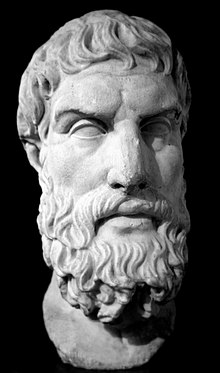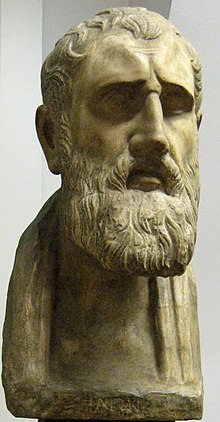One of the things that I find really interesting in this section is the dichotomy between the popular philosophies of the Epicureans and the Stoics. Epicureans did not believe in any higher power or force that created the world. They believed the highest honor you could achieve was to live in a way that brought one the most lasting pleasure. The Stoics believed in a God, but believed that their role on earth was to never be in conflict with nature and just accept things as they come.
  |
| What's up Epicurus, meet Zeno, your fiercest rival. |
Interestingly enough, I find that Epicurus and Zeno (founder of Stoicism) look eerily similar. Kind of like their philosophies. Stay with me here, I know they seem totally opposite, but I think what we're looking at is a kind of political U. It's the concept that two opposite ends of the spectrum are actually closer together than the central view. Epicureans view of self-satisfaction leading to ultimate pleasure and Stoics view of intense internal focus lead both groups to be incredibly self-centered. What then becomes the true opposite end of the spectrum is the teachings of Christ. That in order to achieve our highest station and please God, we must love and serve our fellow man.
While it appears that these are ancient philosophies, I would say that the spirit behind them is alive and well. All you have to do is turn on the television to see examples of people both trying to please themselves or shrugging their shoulders at the world. As followers of Christ we are obligated to both be active participants in our communities, be agents of change for the better, and seek out opportunities to serve and lift others. By following the gospel of Christ we often put ourselves at odds with the world but we can see that His doctrine is really one of peace. It is a meeting place where we can turn our focus outward and in turn better ourselves inwardly.

